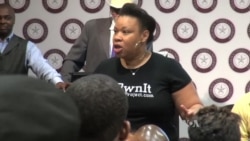A makeshift memorial marks the spot where Sandra Bland was arrested after a traffic stop on July 10.
On July 13, she was found dead in her jail cell. Officials say it was suicide.
Bland’s college classmate Alex McGrew doubts that story.
“She was fun to be around," he said. "She was a cool person and definitely not a sad, suicidal person at all.”
In video recordings she posted on Facebook, her lively, warm personality is evident. But she also spoke about struggling with depression.
“Do not let the depression hold you down; do not let it keep you in the spot where you are, because depression is nothing but the devil,” Bland says in one of the videos.
Those who believe she did take her life blame the Waller County Jail for being negligent and the state trooper who arrested her for being far too aggressive.
“She should not have died in that jail because, if at all, she should have been given a ticket and she should have been on her way,” U.S. Representative Al Green said at one community gathering.
The charge against Bland, 28, was assault on a police officer, which former Waller County Justice of the Peace Dewayne Charleston says set her up for poor treatment in jail.
“They would have denied her phone privileges; they would have delivered her meals late; they would have made her life miserable,” he said.
Waller County officials have denied any improper treatment of Bland in jail.
Some black people in Texas are willing to give officials the benefit of the doubt and await the result of investigations. But many others see the Bland case in the light of past discrimination.
The student population at nearby Prairie View A&M University, where Bland had gone to school, will swell to 9,000 by the end of the month, and Charleston plans to seek their support.
“When the 9,000 students come back, and all the faculty members come back from vacation, it is going to be a whole different ball game," he said.
If there has not been a satisfactory resolution of the Bland case in the next few weeks, when students start arriving for the fall semester, activists say there will be many more, and much larger, protests.





